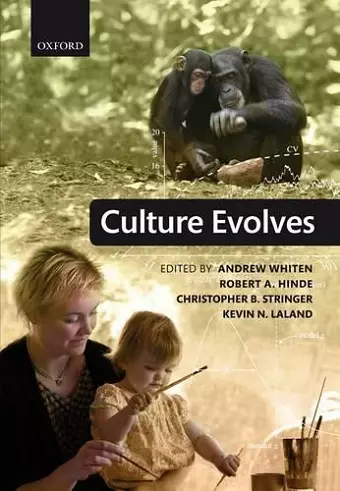Culture Evolves
Robert A Hinde editor Kevin N Laland editor Andrew Whiten editor Christopher B Stringer editor
Format:Hardback
Publisher:Oxford University Press
Published:22nd Dec '11
Currently unavailable, and unfortunately no date known when it will be back

Culture - broadly defined as all we learn from others that endures for long enough to generate customs and traditions - shapes vast swathes of our lives and has allowed the human species to dominate the planet in an evolutionarily unique way. Culture and cultural evolution are uniquely significant phenomena in evolutionary biology: they are products of biological evolution, yet they supplement genetic transmission with social transmission, thus achieving a certain independence from natural selection. However, cultural evolution nevertheless expresses key Darwinian processes itself and also interacts with genetic evolution. Just how culture fits into the grander framework of evolution is a big issue though, yet one that has received relatively little scientific attention compared to, for example, genetic evolution. Our 'capacity for culture' appears so distinctive among animals that it is often thought to separate we cultural beings from the rest of nature and the Darwinian forces that shape it. 'Culture Evolves' presents a different view arising from the recent discoveries of a diverse range of disciplines, that focus on evolutionary continuities. First, recent studies reveal that learning from others and the transmission of traditions are more widespread and significant across the animal kingdom than earlier recognized, helping us understand the evolutionary roots of culture. Second, archaeological discoveries have pushed back the origins of human culture to much more ancient times than traditionally thought. These developments together suggest important continuities between animal and human culture. A third new array of discoveries concerns the later diversification of human cultures, where the operations of Darwinian-like, cultural evolutionary processes are increasingly identified. Finally, surprising discoveries have been made about the imprint of cultural evolution in children's predisposition to acquire culture. The result of a major interdisciplinary meeting held by he Royal Society and the British Academy, this book presents the work of leading experts from the fields of ethology, behavioural ecology, primatology, comparative psychology, archaeology, anthropology, evolutionary biology and developmental psychology.
A compelling account of recent cross-disciplinary progress in solving that mystery of mysteries, the origins of human culture. Perhaps in some important ways, we humans aren't so different after all. Prof Bennett G. Galef, McMaster University, Canada
This collection is an excellent introduction to the vibrant and increasingly diverse field of cultural evolution. It is especially valuable in treating human and non-human culture in a comparative framework Prof Pete Richerson, University of California, USA
Perhaps the most impressive aspect of the volume lies in bringing such a diverse range of topics together in one place, for which the editors should be commended. Rarely does one find oneself considering the social transmission of stickleback foraging behaviour, followed a few chapters later by historical analysis of socio-political organisation in small-scale Pacific island societies. This breadth necessarily encompasses multiple disciplines, from biology to anthropology, psychology, archaeology, linguistics, and sociology. Whereas traditionally such disciplines have had little to do with one another, the evolutionary framework adopted here provides a common language within which to understand these diverse phenomena, from fish foraging to Fijian fiefdoms. * Trends in Ecology & Evolution, June 2013 *
ISBN: 9780199608966
Dimensions: 248mm x 176mm x 33mm
Weight: 996g
472 pages